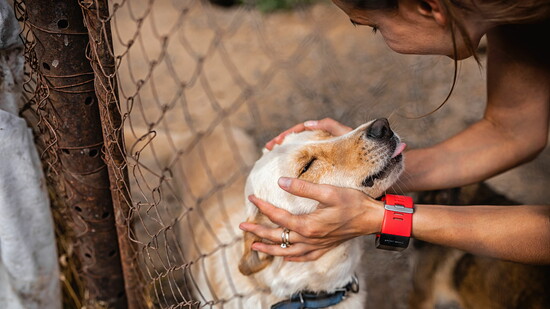No paid staff, no physical location, and assistance to keep pets with the families who love them. There are just a few of the aspects that make the Riley County Humane Society (RCHS) extraordinary. A local non-profit, RCHS is led by veterinarian Lisa Pohlman, alongside her dedicated volunteer team.
“We’re a local, all-volunteer animal welfare organization,” explains Lisa. “We’re not affiliated with national humane societies or government funding. Everything we do is powered by donations, grants, and volunteers.”
The organization’s work is split into two major programs: foster-based rescue and adoption, and a Community Assistance Program. “We’re probably best known for our foster and adoption program, but it’s the assistance work that really makes us different from other organizations,” notes Lisa.
That assistance includes spay/neuter support, emergency veterinary help, and pet food, which is all designed to keep animals in their loving homes. “Our goal is to prevent loved animals from ever entering the shelter system in the first place,” Lisa says. “So many people just need a little help—whether that’s with medication, food, or a one-time vet visit.”
Liz Chasteen, who coordinates much of the foster and adoption work, agrees. “People’s financial situations change. Sometimes someone just needs help affording cat litter. That’s a far better fate than an animal ending up in a shelter.”
One recent case illustrates this perfectly. A woman experiencing homelessness reached out, heartbroken at the thought of surrendering her dog simply because she needed to be away for a few days. RCHS stepped in to board the dog temporarily. “She was tremendously grateful,” Lisa recalls.
These kinds of interventions are often invisible to the public, but they are important for the health and safety of the broader pet population. “When we help one person care for their pet, it benefits the whole community,” Lisa says. “We reduce the number of animals in shelters, prevent disease through vaccinations and parasite control, and keep both animals and people healthier.”
Still, the rescue and adoption work remains central. Without a shelter, RCHS relies entirely on foster homes to house animals until they find permanent ones. This model, while more necessarily limited in volume, allows the organization to thoughtfully place pets.
"Our foster homes really get to know each animal,” says Liz. “That means we can tell adopters how a cat does with other animals or how a dog behaves around kids. We can make better matches.”
Adoptions begin with an online application, followed by a meet-and-greet. “We’re not happy until everyone’s happy,” Liz says. “The foster, the adopter, and the animal.”
Sometimes, matchmaking can change the lives of both the pet and their people. Recently, Lisa fostered Bram, a black cat with feline stomatitis, a painful mouth condition, surrendered to another Kansas shelter . “It’s treatable, but the treatment—full dental extraction—is expensive and not something most shelters can do,” Lisa explains. “But we could.”
After surgery and recovery, Bram was adopted by a single mother and her daughter. “They send us pictures,” Lisa shares. “They can’t imagine life without him now.”
The joy of helping pets find and stay in their forever homes motivates the RCHS team. For Liz, nothing beats the moment when a foster animal meets their forever family. “It’s a life-changing moment for the animal and the humans. It never gets old.”
Behind every success story is the reality that the number of animals RCHS can help is limited by the number of available foster homes. “When we get requests, our first question is always: where will this animal go? If we don’t have a foster, we have to say no,” shares Lisa.
One of the benefits of fostering is its flexibility. “You get a buddy without the financial or long-term commitment,” Liz says. “And then you get another buddy, and another! You’re changing lives.” RCHS provides all food, medical care, and ongoing support for fosters throughout the process. “We don’t just show up with an animal,” Lisa explains. “You choose which animal you take in, and we work with your schedule.”
For those unable to foster, there are still plenty of ways to help. “We need people with technical skills, especially for our website,” Lisa shares. “We’d love help with fundraising, marketing, photography—really, any skill someone wants to offer.”
One pressing need is financial support for their under-recognized assistance work. “Most donations go to our rescue program because that’s easier to showcase,” Lisa notes. “But we also need flexible funding to help people in crisis. That work saves lives just as much.”
Each year, RCHS helps between 100 to 500 pets find forever homes. However, Lisa emphasizes that rescue alone won’t solve the overarching issue. “Rescue is reactive,” she said. “To truly fix the problem, we need to reduce the number of animals entering shelters in the first place. That’s why we focus so much on spay/neuter and community support.”
What do they wish more people understood? “That our work is about more than animals,” Liz shares. “It’s about people, too. Helping someone keep the pet they love, especially in hard times, changes everything.”
To learn more about the Riley County Humane Society or to get involved, visit rchsks.org or follow them on Facebook for the latest updates and available pets.
“We’re not happy until everyone’s happy. The foster, the adopter, and the animal.” - Liz Chasteen
